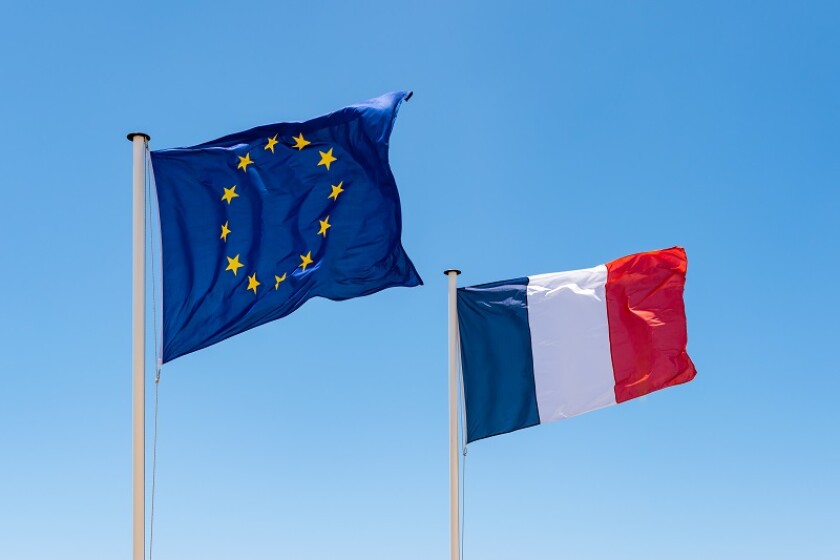As Emmanuel Macron prepares to run for president for the second time, the French government will look to push through as many regulations as is possible throughout the term of its European Council presidency in a bid to maximise impact, sources have said.
Having started on January 1 and set to end on June 30, France’s EC presidency will face the double challenge of running alongside a presidential campaign and taking place in a context of rising geopolitical tensions in Ukraine and the ongoing climate crisis.
“The French presidency takes over at a time of prolonged health crisis and uncertain economic recovery,” said Bozena Gulija, financial regulation consultant and former attaché at the European Court of Auditors. “Some indicators have been going up for two or three quarters, but it’s still too early to say we are out of the V-shaped recession. France’s programme is called Recovery, Strength and Sense of Belonging – such an ambitious agenda may actually be needed at this particular time.”
In a speech before the European Parliament presenting the presidency’s priorities over the next six months, Macron outlined the “three challenges of the century” facing the EU: climate change, the digital revolution, and security (cyber and geopolitical). “A presidency is short, and it has to be concrete,” said France’s Minister of State for European Affairs Clément Beaune during a Bloomberg event. “It’s also a way to select and speed up issues that are seen as key priorities. If we get results in these three areas, we will have made a useful semester of the French presidency.”
The programme of the presidency also outlines three overarching ambitions for the EU during this term: establishing a more sovereign Europe by strengthening the Schengen area, protecting borders, controlling migration and improving the asylum policy; creating a new European model for growth to make Europe a land of production, job creation, innovation and technological excellence; and fostering a more humane Europe, which defends the rule of law and upholds its values, takes pride in its culture, trusts in science and knowledge, and is committed to fighting discrimination and securing a future for the next generation.
At first glance, only the second goal has obvious ties to the financial sector. “Many of the issues that this presidency wants to prioritise are not directly linked to the financial services portfolio,” said Nicolas Véron, senior fellow at the Peterson Institute for International Economics and co-founder of thinktank Bruegel. “These include the carbon border adjustment, taxation and the OECD deal, and everything related to NextGenerationEU. These are important issues that also have relevance for finance but are not within DG FISMA’s [Directorate-General for Financial Stability] scope.”
See also: Sanctions on Russia could affect wider markets
Although taking a pro-European stance is clearly a strategic move from Macron in the context of the presidential campaign, this does not seem to be linked to a particular policy measure or initiative – especially not one that would be new, Véron argued.
“There aren’t many references in the programme to legislative initiatives that are relevant to the financial sector – financial regulation is only mentioned sporadically,” agreed Gulija. “In the end, we don't know how active the presidency will actually be in terms of legislative initiatives. They are arguably dealing with more urgent problems linked to the Covid-19 crisis, geopolitical tensions, and the need to restructure Europe as a more sovereign region to deal with climate change and security.”
Although economy is an important part of the agenda, other sources deplored the lack of more meaningful proposals in this area.
“Lots of fluffy headlines, few concrete measures – Macron’s so-called ‘programme’ is a disappointment,” said Markus Ferber, MEP. “Where the French president did get into the weeds, the proposals translate to overregulation, red tape and more debt. Europe following the ‘French way’ would be bad news for its citizens, businesses and economy.”
Ferber was also critical of France’s overall approach. “[French Finance Minister] Bruno Le Maire talks of a new economic model and means more regulation, more debt and more state intervention: the French economic model under the Macron government is not a good blueprint for Europe,” he said.
Box-ticking
While France will likely want to close as many financial regulation files as possible during its term, it is unlikely to initiate anything new, several sources agreed.
“The French presidency will focus on advancing existing proposals for EU financial and banking regulation as much as possible, rather than proposing any new topics,” said Emilie Rogey, partner at White & Case in Paris. “The goal is to conclude projects that are already subject to proposals from the EU Commission or that are under discussion in the EU Parliament.”
A potential explanation to this, Rogey argued, is that EU financial regulation has now reached a stage where most areas are uniform and harmonised across member states, and do not need a fundamental overhaul.
See also: EU open banking regulation is tip of the iceberg
“Areas in which this may not be the case are typically ones including new products and services, such as cryptoassets,” she added. “Financial and banking regulation takes a while to be adopted and there are impact studies before the launch of any proposal, so putting anything forward would take time. Setting aside the sensitive question of the UK’s post-Brexit equivalence status, financial and banking regulation is also not as critical and political in the public debate as the tax regime or member states’ debt.”
Another explanation, however, is that Macron’s upcoming campaign for a second term in office could mean he prefers to tread a cautious path.
“If you want to get results and deliver, you need to focus on easy wins, such as things that have been prepared by the previous presidencies,” said Benoit Le Bret, partner at Gide Loyrette Nouel. “These typically include the proposals to tackle distortive third-country subsidies and the Carbon Border Adjustment Mechanism, which will be a priority for the candidate Macron. In financial services, he will try to tick boxes and reach agreements on files that are ready, while taking a general approach to others.”
For Macron, being the chair of the EU Council just as he enters the French presidential campaign is perfect timing, Le Bret argued.
“Macron is also looking at his next job: for the next two and a half months, he will be the [EU Council] chair, and then he will become the [presidential] candidate,” he said. “The candidate will clearly not focus on financial services as a priority – instead, he will focus on climate change and on all EU-protecting proposals. The goal at the end of the mandate is to be able to say that the EU is better protected and greener, and that this has been delivered by the French presidency.”
Overall, Le Bret summed up, the momentum of the French presidency will be “short but good”, with the first half of the term being largely political, and the second – marked by Macron’s more distant leadership due to the elections – more technical.
Double-edged sword
While the looming electoral campaign may put wind in France’s EU Council presidency, it could also overshadow it.
“It cuts both ways,” said Véron. “The French presidential campaign will put energy into the Council presidency during the first few weeks, while it’s not running at full speed and ministers and the president himself can still be active on the EU scene. But it will also interfere negatively, as it will likely divert much of their attention from March onwards.”
Minister of State Beaune, however, denied the possibility of such negative impacts, saying that France’s work over the next few months would follow on from what previous presidencies have achieved.
See also: Increased greenwashing scrutiny will alter ESG markets
“It’s not three months, actually, because the presidency is a moment when you try to speed up priorities and texts that have been worked on for years,” he said. “The idea of regulating digital platforms, for instance, is an idea that France and a few other countries have pushed for very strongly since 2017. Even during the presidential campaign, our negotiators and diplomats will go on, and there will also be two more months after the elections.”
Although the EU Council presidency is typically an occasion for political leaders to shine on the European scene and to try and articulate an agenda, their impact remains limited, Véron contended.
“The extent to which the host country – and especially the political leadership of the host country – shakes the agenda on its own, has to be put in context,” he said. “The reality is that some files are inherited from the previous presidency, and some are handed to the next. In that sense, the chair cannot entirely define its own agenda. What it can do, though, is choose where it wants to invest more effort and make progress.”
Overall, Véron explained, the EU Council presidency is a well-oiled machine that is largely out of the host country’s hands, but which can be managed more or less competently.
“Despite the challenges introduced by the very specific context of this presidency, one should not underestimate its potential to deliver,” said Le Bret. “Three months is not that short, and if France cannot reach agreements on all the items, it can at least offer general approaches and advance the debate. My advice would be: don’t have too many expectations, but don’t underestimate the final delivery.”

